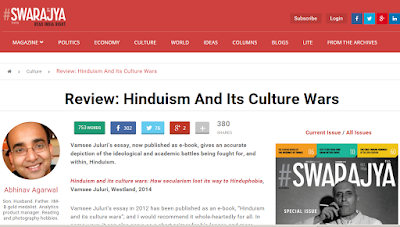Vamsee Juluri's essay in 2012 has been published as an e-book, "Hinduism and its culture wars", and I would recommend it whole-heartedly for all. In some ways, it can also serve as a short primer for his longer, and more recent, book - "Rearming Hinduism".
For those unaware, there has been a raging battle being fought for more than two decades for the soul of Hindu academia. On one side have been the liberals, the orientalist academia, the Hinduphobes - all of whom have had a stranglehold on the mainstream narrative of Hinduism. On the other side have been a section of Hindus who have risen up to challenge this bigoted and jaundiced view of their faith.
Mainstream academicians have trotted out a steady stream of attacks against Hinduism - ranging from the subtle to the outright ridiculous. From terming Hinduism as an invention of the British, Hinduism as itself an import from Europe, and in a truly Twilight Zone moment, to arguing that the concept of India itself has no historical basis - no line of attack has been left untried, in the hope that what sticks would be pursued. Hindu scholars and activists alike have fallen for these diversionary tactics, conforming to a Pavlovian response in expending efforts in trying to address every line of vile abuse.
If Hindus are granted some modicum of nativity in the land, it is only with the intention of showing that they "had a lot of blood on their hands." For the deracinated is invented an altogether wholesome history - that Hinduism itsself was the invention of the British. This confers upon Hinduism a degree of legitimacy, from the West, that satisfies the liberal elite who sees some residual benefit still to be extracted from associating oneself with Hinduism.
The "Westernized, secularist writers" in turn go out of their way to exhibit all the symptoms of one suffering from a pathological persecution complex - agree with them and it only encourages them in their delusions; disagree and they see it as vindication of their casuistry. While such a person will argue with vehemence, sometimes even venom, about the need and necessity to teach - in undergraduate courses for example - not only the traditional Ramayana but also versions where Rama is portrayed as a villain, the same will argue equally vehemently against extending that same logic to other religions!
It is interesting to also note that while the traditional Hindu is portrayed as a fundamentalist who demands fealty to an unchanging interpretation of his religion, there is the reality of Hindus also embracing the modern and very novel interpretations given to Hindu gods - Amish Tripathi's Siva trilogy being a case in point - without collapsing in paroxysms of imagined blasphemy. Liberals and western academics tie themselves in knots trying to explain the two - ignoring the logical and obvious explanation that Hindus have been more liberal and tolerant of multiple interpretations of their dharma than their critics would want to admit. These self-styled experts see nothing objectionable in having their kind refer to Rama and Sita as "d*ck" and "c*nt", respectively, yet are the first to have their sensibilities offended if the same vocabulary is attempted to be extended to other, non-Hindu, faiths. Theological schizophrenia!
Vamsee points out to a very interesting dichotomy prevalent among "his" generation - "Most of the devout Hindus I know of seem to be doctors, engineers, and scientists. Most of the writers, artists, academics and activists (of the left) that I know and know of seem to be disinterested in religion, if not hostile." Perhaps it is the lack of formal skills in scientific methods that may explain why the liberal artist or academic of today is so ill-prepared to defend his views on Hinduism.
In conclusion, an economically resurgent India will naturally want to question the Hinduphobic, bigoted narrative that has been constructed in western academia over a hundred and some years - and aped by India's leftist intelligentsia. It is this economic muscle that threatens to make this an equal battle, for the first time in a hundred and some years. The stakes therefore are higher, and the venom behind the liberal's riposte therefore more a reflection of the underlying fear of being proven wrong, and publicly so.
This review was first published in Swarajya Mag on July 31, 2015.
© 2015, Abhinav Agarwal (अभिनव अग्रवाल). All rights reserved.
